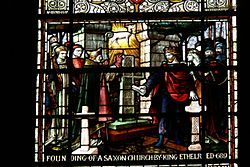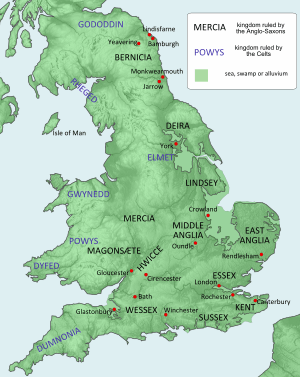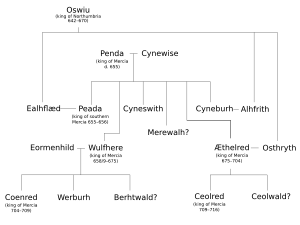Æthelred of Mercia facts for kids
Quick facts for kids Æthelred |
|
|---|---|

Stained glass window in St John's Chester
|
|
| King of Mercia | |
| Reign | 675–704 |
| Predecessor | Wulfhere |
| Successor | Coenred |
| Born | c. 645 AD |
| Died | c. 709 AD |
| Burial | Bardney Abbey, Lindsey |
| Spouse | Osthryth |
| Issue | Ceolred Ceolwald (possibly) |
| Dynasty | Iclingas |
| Father | Penda |
| Mother | Cynewise (possibly) |
| Religion | Christian |
Æthelred (pronounced ATH-el-red) was a powerful king of Mercia, a kingdom in what is now central England. He ruled from 675 to 704 AD. Æthelred was the son of Penda of Mercia, another famous Mercian king. He became king after his brother, Wulfhere of Mercia, passed away.
Æthelred was known for his strong Christian faith. He gave a lot of land and support to the church. During his time, the church in England was reorganized, and new church areas (called dioceses) were created. He also helped Bishop Wilfrid of York when Wilfrid was in trouble with other leaders.
Æthelred's wife was Osthryth, who was the daughter of King Oswiu of Northumbria. Sadly, Osthryth died in 697. In 704, Æthelred decided to give up his throne. He became a monk at Bardney Abbey, a monastery he had helped to build. He was buried there after his death.
Contents
Mercia: A Powerful Kingdom
By the 600s AD, England was mostly divided into kingdoms ruled by the Anglo-Saxons. These people had arrived in Britain about 200 years earlier. The kingdom of Mercia was located in the area we now call the English Midlands.
The Mercian royal family was known as the Iclingas. Æthelred's father, Penda, was one of the earliest Mercian kings we know a lot about. Other big kingdoms nearby included Northumbria to the north, East Anglia to the east, and Wessex to the south.
A monk named Bede wrote a history of the English church around 731 AD. This book, called Ecclesiastical History of the English People, tells us a lot about the early Anglo-Saxon kingdoms. It mentions that some rulers held imperium, meaning they had power over other kingdoms.
Penda, Æthelred's father, was a very strong king. He fought against Northumbria, a powerful kingdom to the north. In 655, Penda was defeated and killed by Oswiu of Northumbria at the Battle of the Winwaed. After this, Northumbria briefly controlled Mercia. However, Mercia soon regained its independence under Æthelred's brother, Wulfhere. By the 670s, Wulfhere was the most powerful king in southern Britain.
Æthelred's Early Reign
Æthelred was the son of King Penda. His mother was likely Queen Cynewise. We don't know exactly when Æthelred was born, but he was probably a teenager when his brother Wulfhere became king in 658. Æthelred also had a brother named Peada and two sisters, Cyneburh and Cyneswith.
In 674, Wulfhere fought against Northumbria but was defeated. He died in 675, possibly from an illness. This is when Æthelred became king of Mercia.
One of Æthelred's first actions as king was to attack Kent in 676. His armies destroyed the city of Rochester. The exact reason for this attack isn't clear. He might have wanted to stop Kent from taking back control of Surrey, an area Mercia had recently gained. This attack showed Æthelred's power in the region.
During Æthelred's reign, Theodore, the Archbishop of Canterbury, started to reorganize the church in Mercia. He divided the large Mercian church area into five smaller ones. Æthelred was a very religious king. He gave many gifts of land to the church. He is also thought to have helped found Abingdon Abbey.
Battles and Diplomacy
Mercia and Northumbria had been fighting for a long time. However, there were also important marriages between the two kingdoms. Æthelred's sister married a son of Oswiu of Northumbria. Æthelred himself married Osthryth, Oswiu's daughter.
In 679, Æthelred fought a major battle against Ecgfrith of Northumbria, his brother-in-law. This was the Battle of the Trent. Ælfwine, Ecgfrith's younger brother and Osthryth's brother, was killed in this battle. His death almost caused more fighting between the kingdoms. But Archbishop Theodore stepped in and helped make peace. The Northumbrians paid a payment to Mercia for Ælfwine's death.
After this battle, Mercia took back control of kingdom of Lindsey. This time, Mercia kept Lindsey for a long time. The Battle of the Trent was very important because it stopped Northumbria from being involved in southern British affairs.
Later, Bishop Wilfrid of York had problems with the church leaders in Northumbria and was sent away. Æthelred supported Wilfrid. He made Wilfrid a bishop in Mercia and defended him at a meeting of bishops around 702. Æthelred's support for Wilfrid caused some disagreements with Canterbury and Northumbria.
Influence in Southern Britain
Æthelred also extended Mercian influence into the lands of the West Saxons. This was similar to what his brother Wulfhere had done. However, the West Saxons became very strong under their kings Cædwalla and Ine. This limited Mercia's chances to expand further south.
Æthelred also had influence in Kent and Essex. He supported some kings in Kent and helped confirm their land grants. This shows that Mercia was still a major power in the southeast. The kingdom of the Hwicce also came under Mercian control during Æthelred's reign. He treated their rulers as sub-kings, meaning they ruled under his authority.
Abdication and Later Life
In 697, Æthelred's wife, Osthryth, was killed. The reasons for her death are not known, but Bede wrote that she was killed by "her own people, the Mercian chieftains." Osthryth was buried at Bardney Abbey, where she had encouraged the worship of her uncle, Oswald of Northumbria.
In 704, Æthelred decided to give up his role as king. He became a monk and abbot at Bardney Abbey. He handed the throne over to his nephew, Coenred. Even after becoming a monk, Æthelred still had some influence. He advised Coenred on important matters.
Æthelred had at least one son, Ceolred. Ceolred became king in 709, after Coenred also gave up the throne to become a monk in Rome. Some records suggest Æthelred might have had another son named Ceolwald, who may have been king briefly before Ceolred. Æthelred died sometime after 704 and was buried at Bardney Abbey. Both Æthelred and Osthryth were later honored as saints at Bardney.
See Also
Images for kids
 | Victor J. Glover |
 | Yvonne Cagle |
 | Jeanette Epps |
 | Bernard A. Harris Jr. |






